Deck 1: Preliminaries
Question
Question
Question
Question
Question
Question
Question
Question
Question
Question
Question
Question
Question
Question
Question
Question
Question
Question
Question
Question
Question
Question
Question
Question
Question
Question
Question
Question
Question
Question
Question
Question
Question
Question
Question
Question
Question
Question
Question
Question
Question
Question
Question
Question
Question
Question
Question
Question
Question
Question
Question
Question
Question
Question
Question
Question
Question
Question
Question
Question
Question
Question
Question
Question
Question
Question
Question
Question
Question
Question
Question
Question
Question
Question
Question
Question
Question
Question
Question
Question

Unlock Deck
Sign up to unlock the cards in this deck!
Unlock Deck
Unlock Deck
1/101
Play
Full screen (f)
Deck 1: Preliminaries
1
Find the distance between the pair of points. (8, -7), (-3, 7)
A)
B) 317
C) 241
D)
A)

B) 317
C) 241
D)


2
Solve the inequality. -11 < -9 - x < -6
A) x > -3 or x < 2
B) x > -2 or x < 3
C) -3 < x < 2
D) -2 < x < 3
A) x > -3 or x < 2
B) x > -2 or x < 3
C) -3 < x < 2
D) -2 < x < 3
-3 < x < 2
3
Solve the inequality. |3x + 2| > 11
A) or x > 3
or x > 3
B) -3 < x < 3
C)
D) all reals
A)
 or x > 3
or x > 3B) -3 < x < 3
C)

D) all reals
 or x > 3
or x > 3 4
Find an equation of the line with slope  passing through point
passing through point  .
.
A)
B)
C)
D)
 passing through point
passing through point  .
.A)

B)

C)

D)


Unlock Deck
Unlock for access to all 101 flashcards in this deck.
Unlock Deck
k this deck
5
Find an equation of the line with slope  passing through point
passing through point  .
.
A)
B)
C)
D)
 passing through point
passing through point  .
.A)

B)

C)

D)


Unlock Deck
Unlock for access to all 101 flashcards in this deck.
Unlock Deck
k this deck
6
Solve the inequality. 
A) x < 1 or x > 5
B) 1 < x < 5
C) x < -3 or x > 5
D) x < -3 or -3 < x < 1 or x > 5

A) x < 1 or x > 5
B) 1 < x < 5
C) x < -3 or x > 5
D) x < -3 or -3 < x < 1 or x > 5

Unlock Deck
Unlock for access to all 101 flashcards in this deck.
Unlock Deck
k this deck
7
Solve the inequality. 
A) ( )
B) x < -5
C)
D) all reals

A) ( )
B) x < -5
C)

D) all reals

Unlock Deck
Unlock for access to all 101 flashcards in this deck.
Unlock Deck
k this deck
8
Determine if the two lines are parallel, perpendicular, or neither.  and
and 
A) parallel
B) perpendicular
C) neither
 and
and 
A) parallel
B) perpendicular
C) neither

Unlock Deck
Unlock for access to all 101 flashcards in this deck.
Unlock Deck
k this deck
9
Solve the inequality. |3x - 6| < 18
A) -8 < x < 8
B) x < -4 or x > 8
C) -4 < x < 8
D) all reals
A) -8 < x < 8
B) x < -4 or x > 8
C) -4 < x < 8
D) all reals

Unlock Deck
Unlock for access to all 101 flashcards in this deck.
Unlock Deck
k this deck
10
Solve the inequality. 
A)
B)
C)
D)

A)

B)

C)

D)


Unlock Deck
Unlock for access to all 101 flashcards in this deck.
Unlock Deck
k this deck
11
Determine if the two lines are parallel, perpendicular, or neither.  and
and 
A) parallel
B) perpendicular
C) neither
 and
and 
A) parallel
B) perpendicular
C) neither

Unlock Deck
Unlock for access to all 101 flashcards in this deck.
Unlock Deck
k this deck
12
Solve the inequality. 4x2 + 2 > 0
A) ( )
B)
C)
D) all reals
A) ( )
B)

C)

D) all reals

Unlock Deck
Unlock for access to all 101 flashcards in this deck.
Unlock Deck
k this deck
13
Find an equation of the line with slope  passing through point
passing through point  .
.
A)
B)
C)
D)
 passing through point
passing through point  .
.A)

B)

C)

D)


Unlock Deck
Unlock for access to all 101 flashcards in this deck.
Unlock Deck
k this deck
14
Determine if the two lines are parallel, perpendicular, or neither.  and
and 
A) parallel
B) perpendicular
C) neither
 and
and 
A) parallel
B) perpendicular
C) neither

Unlock Deck
Unlock for access to all 101 flashcards in this deck.
Unlock Deck
k this deck
15
Find the slope m of the line through the given points. A (-4, 5) and B (-8, -4)
A)
B)
C)
D)
A)

B)

C)

D)


Unlock Deck
Unlock for access to all 101 flashcards in this deck.
Unlock Deck
k this deck
16
Determine if the given points are collinear. (4, -2), (6, 2), (0, -11)
A) Yes
B) No
A) Yes
B) No

Unlock Deck
Unlock for access to all 101 flashcards in this deck.
Unlock Deck
k this deck
17
Solve the inequality. -6 - 6x > -30
A) x < 4
B) x > 4
C) x > 6
D) x < 6
A) x < 4
B) x > 4
C) x > 6
D) x < 6

Unlock Deck
Unlock for access to all 101 flashcards in this deck.
Unlock Deck
k this deck
18
Find the slope m of the line through the given points.  and
and 
A)
B)
C)
D)
 and
and 
A)

B)

C)

D)


Unlock Deck
Unlock for access to all 101 flashcards in this deck.
Unlock Deck
k this deck
19
Determine if the given points are collinear. (-2, 5), (0, 10), (-6, -5)
A) Yes
B) No
A) Yes
B) No

Unlock Deck
Unlock for access to all 101 flashcards in this deck.
Unlock Deck
k this deck
20
Solve the inequality. 7x - 7 > 7
A) x < 2
B) x > 2
C) x > 0
D) x < 0
A) x < 2
B) x > 2
C) x > 0
D) x < 0

Unlock Deck
Unlock for access to all 101 flashcards in this deck.
Unlock Deck
k this deck
21
Use the vertical line test to determine whether or not the graph is a function. 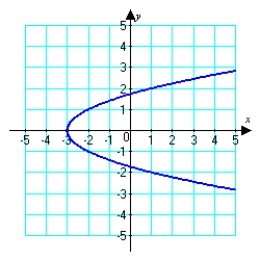
A) function
B) not a function

A) function
B) not a function

Unlock Deck
Unlock for access to all 101 flashcards in this deck.
Unlock Deck
k this deck
22
Decide whether y is a function of x. y = how far an object lands from the base of a building, x = the velocity with which the object is thrown horizontally
A) y is a function of x
B) y is not a function of x
A) y is a function of x
B) y is not a function of x

Unlock Deck
Unlock for access to all 101 flashcards in this deck.
Unlock Deck
k this deck
23
Find the domain of the function. 
A)
B)
C)
D)

A)

B)

C)

D)


Unlock Deck
Unlock for access to all 101 flashcards in this deck.
Unlock Deck
k this deck
24
Find the domain of the function. 
A)
B)
C)
D)

A)

B)

C)

D)


Unlock Deck
Unlock for access to all 101 flashcards in this deck.
Unlock Deck
k this deck
25
Identify the given function as polynomial, rational, both or neither. 
A) polynomial, but not rational
B) rational, but not polynomial
C) both polynomial and rational
D) neither polynomial nor rational

A) polynomial, but not rational
B) rational, but not polynomial
C) both polynomial and rational
D) neither polynomial nor rational

Unlock Deck
Unlock for access to all 101 flashcards in this deck.
Unlock Deck
k this deck
26
Identify the given function as polynomial, rational, both or neither. 
A) polynomial, but not rational
B) rational, but not polynomial
C) both polynomial and rational
D) neither polynomial nor rational

A) polynomial, but not rational
B) rational, but not polynomial
C) both polynomial and rational
D) neither polynomial nor rational

Unlock Deck
Unlock for access to all 101 flashcards in this deck.
Unlock Deck
k this deck
27
Use the vertical line test to determine whether or not the graph is a function. 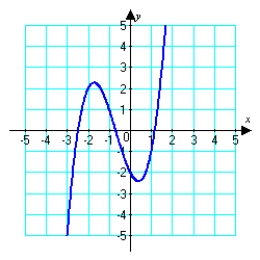
A) function
B) not a function

A) function
B) not a function

Unlock Deck
Unlock for access to all 101 flashcards in this deck.
Unlock Deck
k this deck
28
Use the vertical line test to determine whether or not the graph is a function. 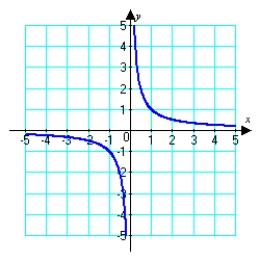
A) function
B) not a function

A) function
B) not a function

Unlock Deck
Unlock for access to all 101 flashcards in this deck.
Unlock Deck
k this deck
29
Use the vertical line test to determine whether or not the graph is a function. 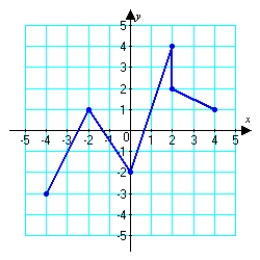
A) function
B) not a function

A) function
B) not a function

Unlock Deck
Unlock for access to all 101 flashcards in this deck.
Unlock Deck
k this deck
30
Find the domain of the function. 
A)
B)
C)
D)

A)

B)

C)

D)


Unlock Deck
Unlock for access to all 101 flashcards in this deck.
Unlock Deck
k this deck
31
Find an equation of the line through the point  and parallel to the line
and parallel to the line  .
.
A)
B)
C)
D)
 and parallel to the line
and parallel to the line  .
.A)

B)

C)

D)


Unlock Deck
Unlock for access to all 101 flashcards in this deck.
Unlock Deck
k this deck
32
Identify the given function as polynomial, rational, both or neither. 
A) polynomial, but not rational
B) rational, but not polynomial
C) both polynomial and rational
D) neither polynomial nor rational

A) polynomial, but not rational
B) rational, but not polynomial
C) both polynomial and rational
D) neither polynomial nor rational

Unlock Deck
Unlock for access to all 101 flashcards in this deck.
Unlock Deck
k this deck
33
Find an equation of the line through the given points. 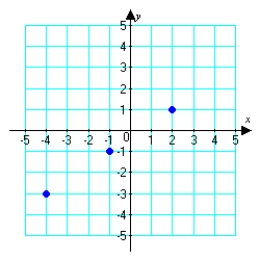
A)
B)
C)
D)

A)

B)

C)

D)


Unlock Deck
Unlock for access to all 101 flashcards in this deck.
Unlock Deck
k this deck
34
Find an equation of the line through the point  and perpendicular to the line
and perpendicular to the line  .
.
A)
B)
C)
D)
 and perpendicular to the line
and perpendicular to the line  .
.A)

B)

C)

D)


Unlock Deck
Unlock for access to all 101 flashcards in this deck.
Unlock Deck
k this deck
35
Find an equation of the line through the point  and perpendicular to the line
and perpendicular to the line  .
.
A)
B)
C)
D)
 and perpendicular to the line
and perpendicular to the line  .
.A)

B)

C)

D)


Unlock Deck
Unlock for access to all 101 flashcards in this deck.
Unlock Deck
k this deck
36
Find the domain of the function. 
A)
B)
C)
D)

A)

B)

C)

D)


Unlock Deck
Unlock for access to all 101 flashcards in this deck.
Unlock Deck
k this deck
37
Determine  when
when  .
.
A)
B)
C)
D)
 when
when  .
.A)

B)

C)

D)


Unlock Deck
Unlock for access to all 101 flashcards in this deck.
Unlock Deck
k this deck
38
Find an equation of the line through the given points. 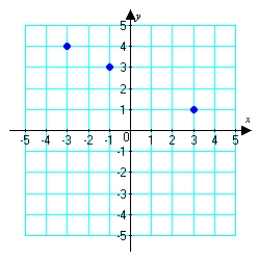
A)
B)
C)
D)

A)

B)

C)

D)


Unlock Deck
Unlock for access to all 101 flashcards in this deck.
Unlock Deck
k this deck
39
Identify the given function as polynomial, rational, both or neither. 
A) polynomial, but not rational
B) rational, but not polynomial
C) both polynomial and rational
D) neither polynomial nor rational

A) polynomial, but not rational
B) rational, but not polynomial
C) both polynomial and rational
D) neither polynomial nor rational

Unlock Deck
Unlock for access to all 101 flashcards in this deck.
Unlock Deck
k this deck
40
Determine  when
when  .
.
A)
B)
C)
D)
 when
when  .
.A)

B)

C)

D)


Unlock Deck
Unlock for access to all 101 flashcards in this deck.
Unlock Deck
k this deck
41
A child's height h (in inches) closely resembles a linear function in terms of the child's age a (in years) if the child is between the ages of 5 and 10. The height of a certain youngster is 46 inches when the child is age 5, and 55 inches at age 7. Find a linear function relating a child's height h to his or her age a.
A)
B)
C)
D)
A)

B)

C)

D)


Unlock Deck
Unlock for access to all 101 flashcards in this deck.
Unlock Deck
k this deck
42
A child's height h (in inches) closely resembles a linear function in terms of the child's age a (in years) if the child is between the ages of 5 and 10. The height of a certain youngster is 46 inches when the child is age 5, and 55 inches at age 7. Determine the height of a child when he is 10 years old.
A)
B)
C)
D)
A)

B)

C)

D)


Unlock Deck
Unlock for access to all 101 flashcards in this deck.
Unlock Deck
k this deck
43
Find all intercepts of the graph of  .
.
A) x-int(s): ; y-int:
; y-int: 
B) x-int(s): ; y-int:
; y-int: 
C) x-int(s): ; y-int: 0
; y-int: 0
D) x-int(s): ; y-int:
; y-int: 
 .
.A) x-int(s):
 ; y-int:
; y-int: 
B) x-int(s):
 ; y-int:
; y-int: 
C) x-int(s):
 ; y-int: 0
; y-int: 0D) x-int(s):
 ; y-int:
; y-int: 

Unlock Deck
Unlock for access to all 101 flashcards in this deck.
Unlock Deck
k this deck
44
Graph the following function and describe all extrema. Round answers to the nearest thousandth. 
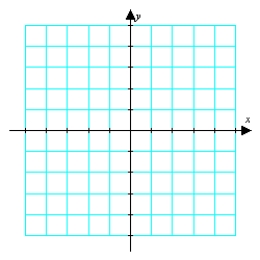
A)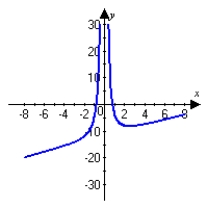 No minimum nor maximum occurs.
No minimum nor maximum occurs.
B)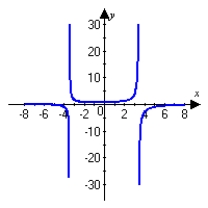 A minimum occurs at
A minimum occurs at  .
.
No maximum occurs.
C)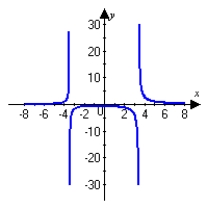 A minimum occurs at
A minimum occurs at  .
.
A maximum occurs at .
.
D)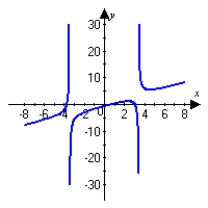 No minimum nor maximum occurs.
No minimum nor maximum occurs.


A)
 No minimum nor maximum occurs.
No minimum nor maximum occurs.B)
 A minimum occurs at
A minimum occurs at  .
.No maximum occurs.
C)
 A minimum occurs at
A minimum occurs at  .
.A maximum occurs at
 .
.D)
 No minimum nor maximum occurs.
No minimum nor maximum occurs.
Unlock Deck
Unlock for access to all 101 flashcards in this deck.
Unlock Deck
k this deck
45
Find all intercepts of the graph of  .
.
A) x-int(s): ; y-int:
; y-int: 
B) x-int(s): ; y-int:
; y-int: 
C) x-int(s): ; y-int:
; y-int: 
D) x-int(s): ; y-int:
; y-int: 
 .
.A) x-int(s):
 ; y-int:
; y-int: 
B) x-int(s):
 ; y-int:
; y-int: 
C) x-int(s):
 ; y-int:
; y-int: 
D) x-int(s):
 ; y-int:
; y-int: 

Unlock Deck
Unlock for access to all 101 flashcards in this deck.
Unlock Deck
k this deck
46
Use the quadratic formula to find all the zeros. 
A)
B)
C)
D)

A)

B)

C)

D)


Unlock Deck
Unlock for access to all 101 flashcards in this deck.
Unlock Deck
k this deck
47
Graph the following function and describe all extrema. 
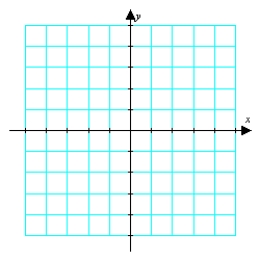
A)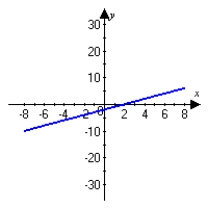 No minimum nor maximum occurs.
No minimum nor maximum occurs.
B)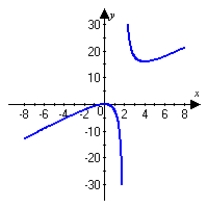 A minimum occurs at
A minimum occurs at  .
.
A maximum occurs at .
.
C)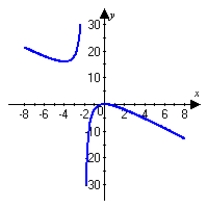 A minimum occurs at
A minimum occurs at  .
.
A maximum occurs at .
.
D)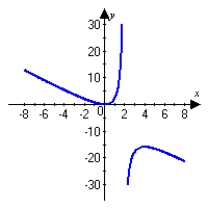 A minimum occurs at
A minimum occurs at  .
.
A maximum occurs at .
.


A)
 No minimum nor maximum occurs.
No minimum nor maximum occurs.B)
 A minimum occurs at
A minimum occurs at  .
.A maximum occurs at
 .
.C)
 A minimum occurs at
A minimum occurs at  .
.A maximum occurs at
 .
.D)
 A minimum occurs at
A minimum occurs at  .
.A maximum occurs at
 .
.
Unlock Deck
Unlock for access to all 101 flashcards in this deck.
Unlock Deck
k this deck
48
Find all intercepts of the graph of  .
.
A) x-int(s): ; y-int:
; y-int: 
B) x-int(s): ; y-int:
; y-int: 
C) x-int(s): ; y-int:
; y-int: 
D) x-int(s): ; y-int:
; y-int: 
 .
.A) x-int(s):
 ; y-int:
; y-int: 
B) x-int(s):
 ; y-int:
; y-int: 
C) x-int(s):
 ; y-int:
; y-int: 
D) x-int(s):
 ; y-int:
; y-int: 

Unlock Deck
Unlock for access to all 101 flashcards in this deck.
Unlock Deck
k this deck
49
Graph the following function and describe all vertical asymptotes. Round answers to the nearest hundredth. 
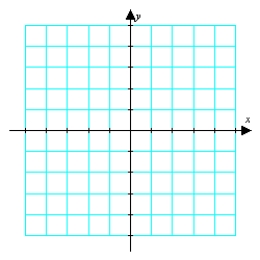
A)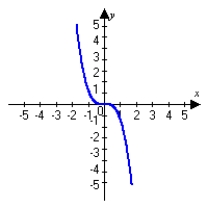 no vertical asymptotes
no vertical asymptotes
B)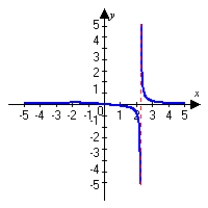 vertical asymptote: x = 2.29
vertical asymptote: x = 2.29
C)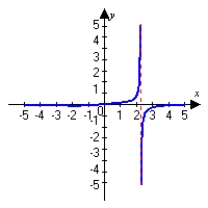 vertical asymptote: x = 2.29
vertical asymptote: x = 2.29
D)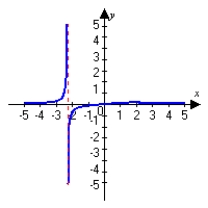 vertical asymptote: x = -2.29
vertical asymptote: x = -2.29


A)
 no vertical asymptotes
no vertical asymptotesB)
 vertical asymptote: x = 2.29
vertical asymptote: x = 2.29C)
 vertical asymptote: x = 2.29
vertical asymptote: x = 2.29D)
 vertical asymptote: x = -2.29
vertical asymptote: x = -2.29
Unlock Deck
Unlock for access to all 101 flashcards in this deck.
Unlock Deck
k this deck
50
Graph the following function and describe all intercepts. 
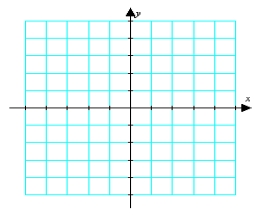
A)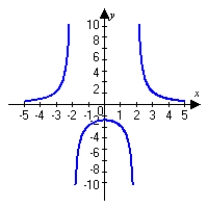 no x-intercepts
no x-intercepts
Y-intercept: (0, -2)
B)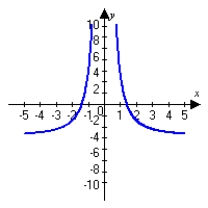 x-intercepts:
x-intercepts:  ,
, 
No y-intercepts
C)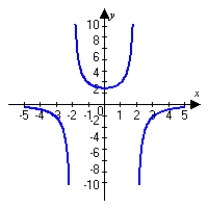 no x-intercepts
no x-intercepts
Y-intercept: (0, 2)
D)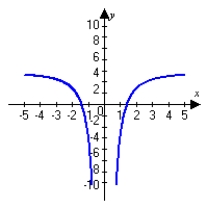 x-intercepts:
x-intercepts:  ,
, 
No y-intercept


A)
 no x-intercepts
no x-interceptsY-intercept: (0, -2)
B)
 x-intercepts:
x-intercepts:  ,
, 
No y-intercepts
C)
 no x-intercepts
no x-interceptsY-intercept: (0, 2)
D)
 x-intercepts:
x-intercepts:  ,
, 
No y-intercept

Unlock Deck
Unlock for access to all 101 flashcards in this deck.
Unlock Deck
k this deck
51
Graph the following function and describe all intercepts. Round answers to the nearest hundredth. 
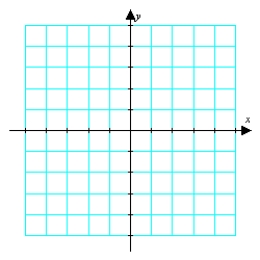
A)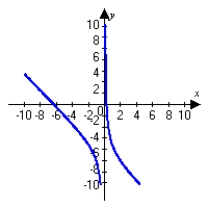 x-intercepts: (-6.73, 0), (0.35, 0)
x-intercepts: (-6.73, 0), (0.35, 0)
No y-intercept
B)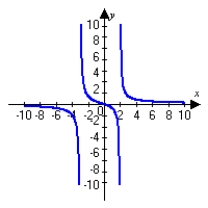 intercept: (0, 0)
intercept: (0, 0)
C)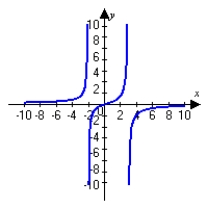 intercept: (0, 0)
intercept: (0, 0)
D)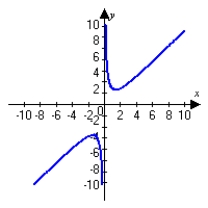 no intercepts
no intercepts


A)
 x-intercepts: (-6.73, 0), (0.35, 0)
x-intercepts: (-6.73, 0), (0.35, 0)No y-intercept
B)
 intercept: (0, 0)
intercept: (0, 0)C)
 intercept: (0, 0)
intercept: (0, 0)D)
 no intercepts
no intercepts
Unlock Deck
Unlock for access to all 101 flashcards in this deck.
Unlock Deck
k this deck
52
Graph the following function and describe all extrema. Round answers to the nearest hundredth. 
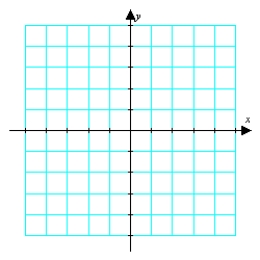
A)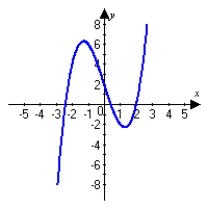 A minimum occurs at
A minimum occurs at  .
.
A maximum occurs at .
.
B)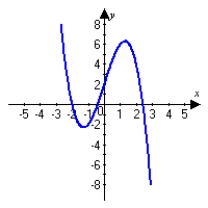 A minimum occurs at
A minimum occurs at  .
.
A maximum occurs at .
.
C)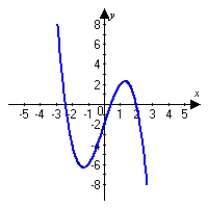 A minimum occurs at
A minimum occurs at  .
.
A maximum occurs at .
.
D)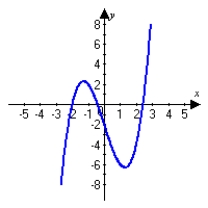 . A minimum occurs at
. A minimum occurs at  .
.
A maximum occurs at .
.


A)
 A minimum occurs at
A minimum occurs at  .
.A maximum occurs at
 .
.B)
 A minimum occurs at
A minimum occurs at  .
.A maximum occurs at
 .
.C)
 A minimum occurs at
A minimum occurs at  .
.A maximum occurs at
 .
.D)
 . A minimum occurs at
. A minimum occurs at  .
.A maximum occurs at
 .
.
Unlock Deck
Unlock for access to all 101 flashcards in this deck.
Unlock Deck
k this deck
53
Graph the following function and describe all intercepts. Round answers to the nearest thousandth. 
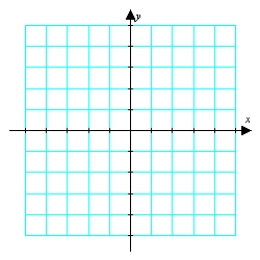
A)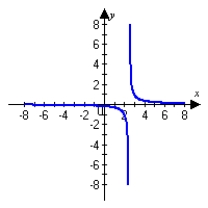 no x-intercept
no x-intercept
Y-intercept: (0, -0.021)
B)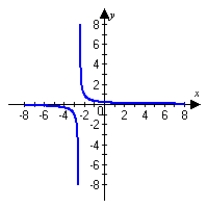 no x-intercept
no x-intercept
Y-intercept = (0, 0.021)
C)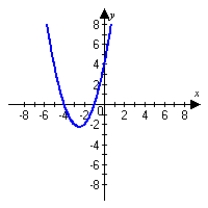 x-intercepts: (-4, 0), (-1, 0)
x-intercepts: (-4, 0), (-1, 0)
Y-intercept: (0, 4)
D)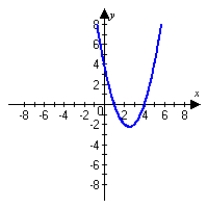 x-intercepts: (4,0), (1, 0)
x-intercepts: (4,0), (1, 0)
Y-intercept: (0, 4)


A)
 no x-intercept
no x-interceptY-intercept: (0, -0.021)
B)
 no x-intercept
no x-interceptY-intercept = (0, 0.021)
C)
 x-intercepts: (-4, 0), (-1, 0)
x-intercepts: (-4, 0), (-1, 0)Y-intercept: (0, 4)
D)
 x-intercepts: (4,0), (1, 0)
x-intercepts: (4,0), (1, 0)Y-intercept: (0, 4)

Unlock Deck
Unlock for access to all 101 flashcards in this deck.
Unlock Deck
k this deck
54
Graph the following function and describe all vertical asymptotes. Round answers to the nearest hundredth. 
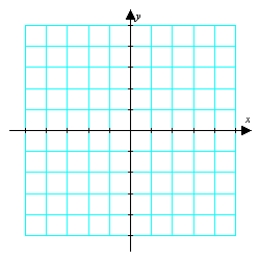
A)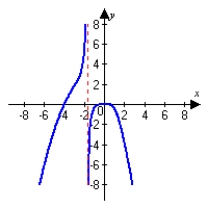 vertical asymptote: x = -1.71
vertical asymptote: x = -1.71
B)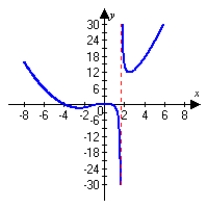 vertical asymptote: x = 1.71
vertical asymptote: x = 1.71
C)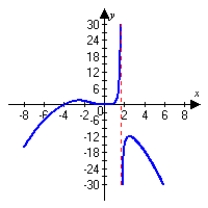 vertical asymptote: x = 1.71
vertical asymptote: x = 1.71
D)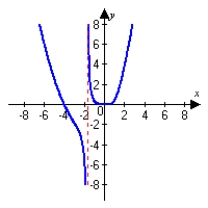 vertical asymptote: x = -1.71
vertical asymptote: x = -1.71


A)
 vertical asymptote: x = -1.71
vertical asymptote: x = -1.71B)
 vertical asymptote: x = 1.71
vertical asymptote: x = 1.71C)
 vertical asymptote: x = 1.71
vertical asymptote: x = 1.71D)
 vertical asymptote: x = -1.71
vertical asymptote: x = -1.71
Unlock Deck
Unlock for access to all 101 flashcards in this deck.
Unlock Deck
k this deck
55
Graph the following function and describe all intercepts. Round answers to the nearest hundredth. 
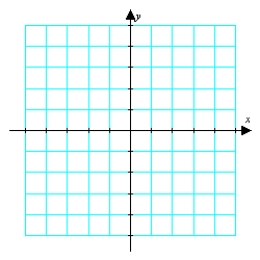
A)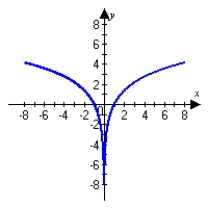 x-intercepts: (1,0), (-1, 0)
x-intercepts: (1,0), (-1, 0)
No y-intercept
B)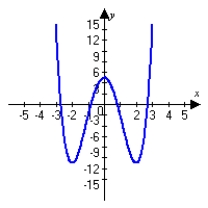 x-intercepts: (-2.70, 0), (-0.83, 0), (0.83, 0), (2.70, 0)
x-intercepts: (-2.70, 0), (-0.83, 0), (0.83, 0), (2.70, 0)
Y-intercept: (0, 5)
C)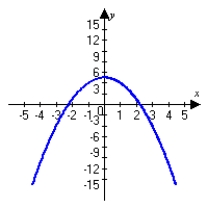 x-intercepts: (-2.14, 0), (2.14,0)
x-intercepts: (-2.14, 0), (2.14,0)
Y-intercept: (0, 5)
D)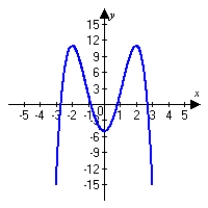 x-intercepts: (-2.70, 0), (-0.83,0 ), (0.83, 0), (2.70, 0)
x-intercepts: (-2.70, 0), (-0.83,0 ), (0.83, 0), (2.70, 0)
Y-intercept: (0, -5)


A)
 x-intercepts: (1,0), (-1, 0)
x-intercepts: (1,0), (-1, 0)No y-intercept
B)
 x-intercepts: (-2.70, 0), (-0.83, 0), (0.83, 0), (2.70, 0)
x-intercepts: (-2.70, 0), (-0.83, 0), (0.83, 0), (2.70, 0)Y-intercept: (0, 5)
C)
 x-intercepts: (-2.14, 0), (2.14,0)
x-intercepts: (-2.14, 0), (2.14,0)Y-intercept: (0, 5)
D)
 x-intercepts: (-2.70, 0), (-0.83,0 ), (0.83, 0), (2.70, 0)
x-intercepts: (-2.70, 0), (-0.83,0 ), (0.83, 0), (2.70, 0)Y-intercept: (0, -5)

Unlock Deck
Unlock for access to all 101 flashcards in this deck.
Unlock Deck
k this deck
56
Decide whether y is a function of x. y = the social security number and x = the birth date (day and month) of a sample of 1000 Americans
A) y is a function of x
B) y is not a function of x
A) y is a function of x
B) y is not a function of x

Unlock Deck
Unlock for access to all 101 flashcards in this deck.
Unlock Deck
k this deck
57
Graph the following function and describe all extrema. Round answers to the nearest hundredth. 
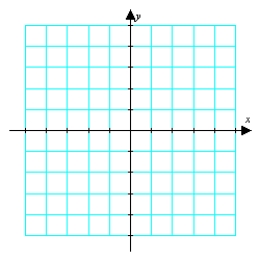
A)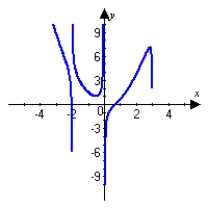 A minimum occurs at
A minimum occurs at  .
.
A maxumum occurs at .
.
B)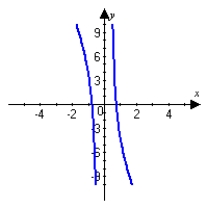 No minimum nor maximum occurs.
No minimum nor maximum occurs.
C)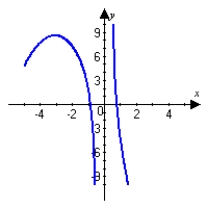 No minimum occurs.
No minimum occurs.
A maximum occurs at .
.
D)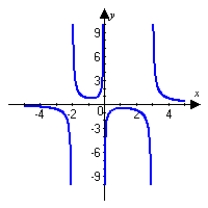 A minimum occurs at
A minimum occurs at  .
.
A maximum occurs at .
.


A)
 A minimum occurs at
A minimum occurs at  .
.A maxumum occurs at
 .
.B)
 No minimum nor maximum occurs.
No minimum nor maximum occurs.C)
 No minimum occurs.
No minimum occurs.A maximum occurs at
 .
.D)
 A minimum occurs at
A minimum occurs at  .
.A maximum occurs at
 .
.
Unlock Deck
Unlock for access to all 101 flashcards in this deck.
Unlock Deck
k this deck
58
Use the quadratic formula to find all the zeros. 
A)
B)
C)
D)

A)

B)

C)

D)


Unlock Deck
Unlock for access to all 101 flashcards in this deck.
Unlock Deck
k this deck
59
Use the quadratic formula to find all the zeros. 
A)
B)
C)
D)

A)

B)

C)

D)


Unlock Deck
Unlock for access to all 101 flashcards in this deck.
Unlock Deck
k this deck
60
Graph the following function and describe all extrema. 
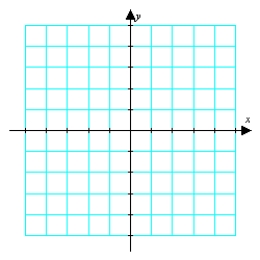
A)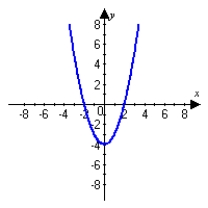 A minimum occurs at
A minimum occurs at  .
.
No maximum occurs.
B)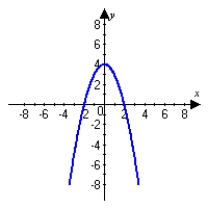 No minimum occurs.
No minimum occurs.
A maximum occurs at .
.
C)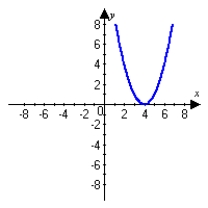 A minimum occurs at
A minimum occurs at  .
.
No maximum occurs.
D)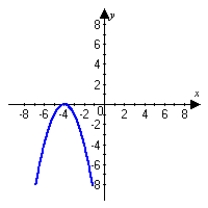 No minimum occurs.
No minimum occurs.
A maximum occurs at .
.


A)
 A minimum occurs at
A minimum occurs at  .
.No maximum occurs.
B)
 No minimum occurs.
No minimum occurs.A maximum occurs at
 .
.C)
 A minimum occurs at
A minimum occurs at  .
.No maximum occurs.
D)
 No minimum occurs.
No minimum occurs.A maximum occurs at
 .
.
Unlock Deck
Unlock for access to all 101 flashcards in this deck.
Unlock Deck
k this deck
61
Identify the amplitude, period and frequency of  .
.
A) amplitude = period =
period = 
Frequency =
B) amplitude = period =
period = 
Frequency =
C) amplitude = period =
period = 
Frequency =
D) amplitude = period =
period = 
Frequency =
 .
.A) amplitude =
 period =
period = 
Frequency =

B) amplitude =
 period =
period = 
Frequency =

C) amplitude =
 period =
period = 
Frequency =

D) amplitude =
 period =
period = 
Frequency =


Unlock Deck
Unlock for access to all 101 flashcards in this deck.
Unlock Deck
k this deck
62
Convert  to radians.
to radians.
A)
B)
C)
D)
 to radians.
to radians.A)

B)

C)

D)


Unlock Deck
Unlock for access to all 101 flashcards in this deck.
Unlock Deck
k this deck
63
Sketch the graph of the function on the interval  .
. 
A)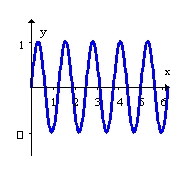
B)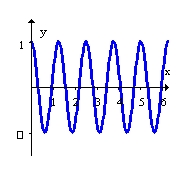
C)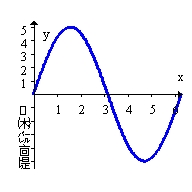
D)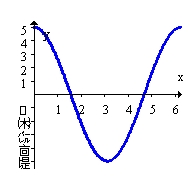
 .
. 
A)

B)

C)

D)


Unlock Deck
Unlock for access to all 101 flashcards in this deck.
Unlock Deck
k this deck
64
Use a graphing utility to estimate all zeros. Round answers to the nearest hundredth. 
A)
B)
C)
D) no real zeros

A)

B)

C)

D) no real zeros

Unlock Deck
Unlock for access to all 101 flashcards in this deck.
Unlock Deck
k this deck
65
Convert  to radians.
to radians.
A)
B)
C)
D)
 to radians.
to radians.A)

B)

C)

D)


Unlock Deck
Unlock for access to all 101 flashcards in this deck.
Unlock Deck
k this deck
66
Convert  radians to degrees. Round answer to the nearest tenth of a degree.
radians to degrees. Round answer to the nearest tenth of a degree.
A) 446.0
B) 458.4
C) 525.9
D) 547.6
 radians to degrees. Round answer to the nearest tenth of a degree.
radians to degrees. Round answer to the nearest tenth of a degree.A) 446.0

B) 458.4

C) 525.9

D) 547.6


Unlock Deck
Unlock for access to all 101 flashcards in this deck.
Unlock Deck
k this deck
67
Use a graphing utility to estimate all zeros. Round answers to the nearest hundredth. 
A)
B)
C)
D) no real zeros

A)

B)

C)

D) no real zeros

Unlock Deck
Unlock for access to all 101 flashcards in this deck.
Unlock Deck
k this deck
68
Identify the amplitude, period and frequency of  .
.
A) amplitude = period =
period = 
Frequency =
B) amplitude = period =
period = 
Frequency =
C) amplitude = period =
period = 
Frequency =
D) amplitude = period =
period = 
Frequency =
 .
.A) amplitude =
 period =
period = 
Frequency =

B) amplitude =
 period =
period = 
Frequency =

C) amplitude =
 period =
period = 
Frequency =

D) amplitude =
 period =
period = 
Frequency =


Unlock Deck
Unlock for access to all 101 flashcards in this deck.
Unlock Deck
k this deck
69
Graph the following function and describe all vertical asymptotes. 
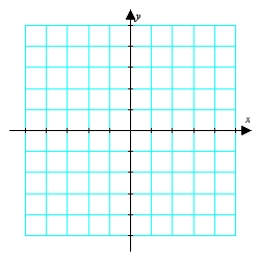
A)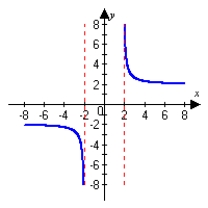 vertical asymptotes:
vertical asymptotes: 
B)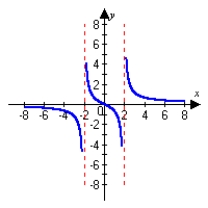 vertical asymptotes:
vertical asymptotes: 
C)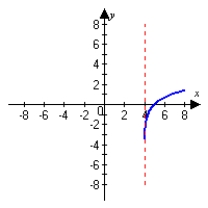 vertical asymptote:
vertical asymptote: 
D)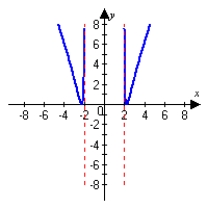 vertical asymptotes:
vertical asymptotes: 


A)
 vertical asymptotes:
vertical asymptotes: 
B)
 vertical asymptotes:
vertical asymptotes: 
C)
 vertical asymptote:
vertical asymptote: 
D)
 vertical asymptotes:
vertical asymptotes: 

Unlock Deck
Unlock for access to all 101 flashcards in this deck.
Unlock Deck
k this deck
70
Find all solutions of  .
.
A)
B)
C)
D)
 .
.A)

B)

C)

D)


Unlock Deck
Unlock for access to all 101 flashcards in this deck.
Unlock Deck
k this deck
71
Find all solutions of  .
.
A)
B)
C)
D)
 .
.A)

B)

C)

D)


Unlock Deck
Unlock for access to all 101 flashcards in this deck.
Unlock Deck
k this deck
72
Find all solutions to the equation  on the interval
on the interval  .
.
A)

B)
C)

D)
 on the interval
on the interval  .
.A)


B)

C)


D)


Unlock Deck
Unlock for access to all 101 flashcards in this deck.
Unlock Deck
k this deck
73
Find the points of intersection of the two curves. Round answers to the nearest hundredth. 
A)
B)
C)
D) The curves do not intersect.

A)

B)

C)

D) The curves do not intersect.

Unlock Deck
Unlock for access to all 101 flashcards in this deck.
Unlock Deck
k this deck
74
Find the points of intersection of the two curves. Give exact values for the points. 
A)
B)
C)
D)

A)

B)

C)

D)


Unlock Deck
Unlock for access to all 101 flashcards in this deck.
Unlock Deck
k this deck
75
Graph the following function and describe all asymptotes. Round answers to the nearest hundredth. 
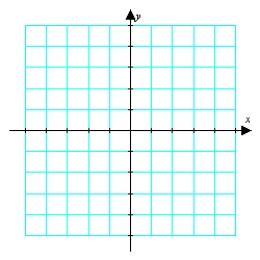
A)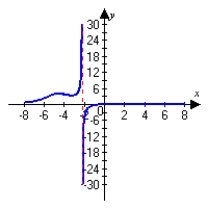 vertical asymptote: x = -2.21
vertical asymptote: x = -2.21
B)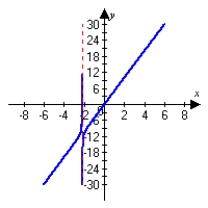 vertical asymptote: x = -2.21
vertical asymptote: x = -2.21
C)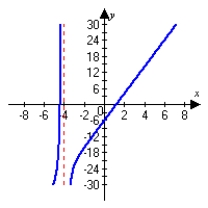 vertical asymptote: x = -4
vertical asymptote: x = -4
D)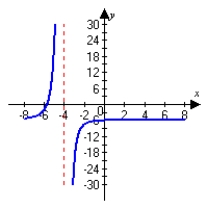 vertical asymptote: x = -4
vertical asymptote: x = -4


A)
 vertical asymptote: x = -2.21
vertical asymptote: x = -2.21B)
 vertical asymptote: x = -2.21
vertical asymptote: x = -2.21C)
 vertical asymptote: x = -4
vertical asymptote: x = -4D)
 vertical asymptote: x = -4
vertical asymptote: x = -4
Unlock Deck
Unlock for access to all 101 flashcards in this deck.
Unlock Deck
k this deck
76
Use a graphing utility to estimate all zeros. Round answers to the nearest hundredth. 
A)
B)
C)
D) no real zeros

A)

B)

C)

D) no real zeros

Unlock Deck
Unlock for access to all 101 flashcards in this deck.
Unlock Deck
k this deck
77
Convert  radians to degrees.
radians to degrees.
A) 81
B) 93
C) 108
D) 136
 radians to degrees.
radians to degrees.A) 81

B) 93

C) 108

D) 136


Unlock Deck
Unlock for access to all 101 flashcards in this deck.
Unlock Deck
k this deck
78
Graph  .
. 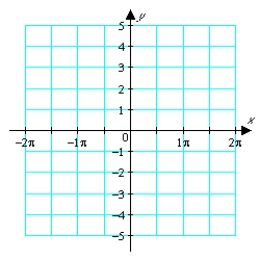
A)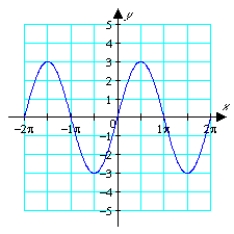
B)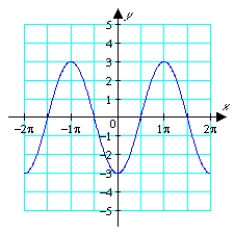
C)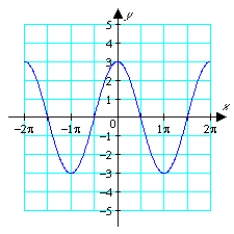
D)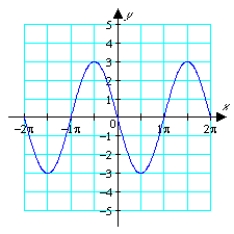
 .
. 
A)

B)

C)

D)


Unlock Deck
Unlock for access to all 101 flashcards in this deck.
Unlock Deck
k this deck
79
Graph  .
. 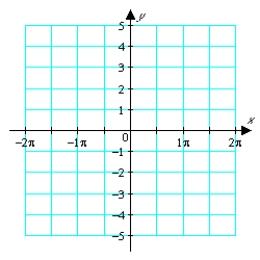
A)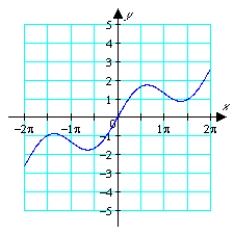
B)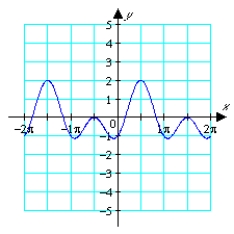
C)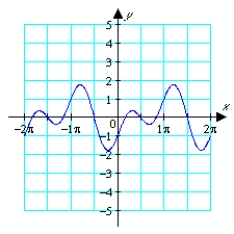
D)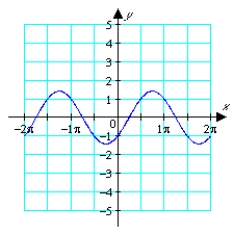
 .
. 
A)

B)

C)

D)


Unlock Deck
Unlock for access to all 101 flashcards in this deck.
Unlock Deck
k this deck
80
Find the points of intersection of the two curves. Round answers to the nearest hundredth. 
A)
B)
C)
D) The curves do not intersect.

A)

B)

C)

D) The curves do not intersect.

Unlock Deck
Unlock for access to all 101 flashcards in this deck.
Unlock Deck
k this deck


